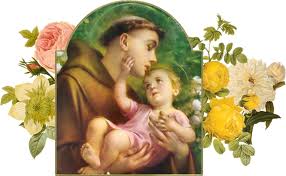INVOKED TO FIND LOST OBJECTS; PATRON OF THE SPINSTERS, THE POOR AND INFERTILE
We are told that “severe temptations against purity afflicted Antony during his teens” (when his name was Ferdinand and he lived in Lisbon), but he overcame them with prayer and joined the Augustinian Order. In 1219, he changed habits, becoming a Franciscan in order to travel to Africa and be martyred by savage Moors. He adopted the name of Antony, but ill health forced him to abandon his mission to the Muslims. When he attempted to sail home, a providential storm blew his ship off course, landing him in Sicily. There he met with Saint Francis of Assisi himself, who commanded him to go forth and preach against the heretics. Antony was some preacher. In Rimini, when the unbelievers refused to hear him, he went to the riverbank and preached to the fishes, who stood on their tails in the water and listened. (When his remains were unearthed in Padua long after his death, the flesh had decomposed, except for the tongue, which was “fresh and red.”) A novice who borrowed Antony’s prayer book without permission hastily returned it after suffering “a fearful apparition”—hence the Saint’s association with the recovery of lost articles. Like all Franciscans, Antony was devoted to those in need. On his feast day, charitable donations are left before images of the Saint, folding money is often pinned to stoles draped around his statues’ necks, and loaves of “Saint Antony’s bread” are distributed to the poor. Although he was nicknamed in his lifetime “the hammer of heretics,” his emblem is a lily.


These are just hilarious. They never taught us this in catechism. Just great.
Thanks so much! Saints just get better and better….xo